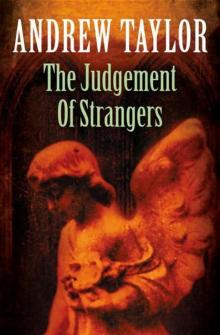The Judgement of Strangers 

Genre: Mystery
Published: 1997
Series: Roth Trilogy
View: 2222
Read OnlineRead The Judgement of Strangers Storyline:
The second novel in Andrew Taylor’s ground-breaking Roth trilogy, which was adapted into the acclaimed drama Fallen Angel. A haunting thriller for fans of S J Watson.It is 1970. David Byfield, a widowed parish priest with a dark past and a darker future, brings home a new wife to Roth. Throughout the summer, the consequences of the marriage reverberate through a village now submerged in a sprawling London suburb.Blinded by lust, Byfield is oblivious to the dangers that lie all about him: the menopausal churchwarden with a hopeless passion for her priest; his beautiful, neglected teenage daughter Rosemary; and the sinister presence of Frances Youlgreave – poet, opium addict and suicide – whose power stretches beyond the grave.Soon the murders and blasphemies begin. But does the responsibility lie in the present or the past? And can Byfield, a prisoner of his own passion, break through to the truth before the final tragedy destroys what he most cherishes?Amazon.com ReviewThere's a wonderfully sly, almost mocking overtone to this middle part of a mystery trilogy by British master Andrew Taylor. As the narrator--a pompous, self-pitying clergyman named David Byfield--says about a dinner engagement: "As a consequence of my accepting their invitation, two people died, a third went to prison, and a fourth was admitted to a hospital for the insane." No beating about the bush there, or anywhere else in this story set in 1970 (25 years before the events of The Four Last Things, the first book in Taylor's trilogy about a fictional London suburb called Roth). The Judgement of Strangers helps explain what happens in the first book, but also stands on its own as a mordant mystery about sexual repression.Byfield, a handsome widower with a psychologically fragile teenaged daughter, stirs up trouble with his attention to several women, all of whom pay a much higher price than he does. By making Byfield such a dolt, Taylor lets us sympathize with even the most odious of his conquests--Audrey, the obsessed local historian and operator of the world's nastiest teashop. "I watched the excitement draining from Audrey's face like water from a bath," Byfield tells us. "I felt ashamed of myself and also irritated with her. Why did she insist on calling Roth a village? It was a suburb of London, similar in all essentials to a dozen others. Most of its inhabitants had their real lives elsewhere. In Roth they merely serviced their bodily needs, watched television and on Sundays played golf or cleaned their Ford Cortinas." Book three promises to go back even further in time and tell us how Byfield's first wife died. --Dick AdlerFrom Publishers WeeklyThis second book in the planned Roth Trilogy looks back a generation at some of the origins of characters and action in the first book, The Four Last Things (1997). Taylor builds a powerful narrative as his struggling characters face an array of temptations that the reader knows early on will overwhelm them. Set in 1970 in the village of Roth, near London, the tale is narrated by David Byfield, a Church of England minister. The near bucolic setting hides a raft of jealousies and passions that quietly build and seethe until the inevitable crest. As David, his new wife, Vanessa, his daughter Rosemary, home for school holiday, and his godson Michael try to adapt to living with one another, other forces obtrude. But David's concern with the church fete stirs up trouble, as does Vanessa's research into the life of the mad poet-priest, Francis Youlgreave, buried in the parish church, and Rosemary's infatuation with the handsome young man who has just moved into Roth Park, the village's big manor house. The clincher is David's growing attraction to the young man's ethereal older sister. Although Taylor has willingly sacrificed some suspense by adopting this reverse chronology, he is sufficiently skillful to keep the reader on edge all the way to the stunning climax. Copyright 1998 Reed Business Information, Inc.Pages of The Judgement of Strangers :